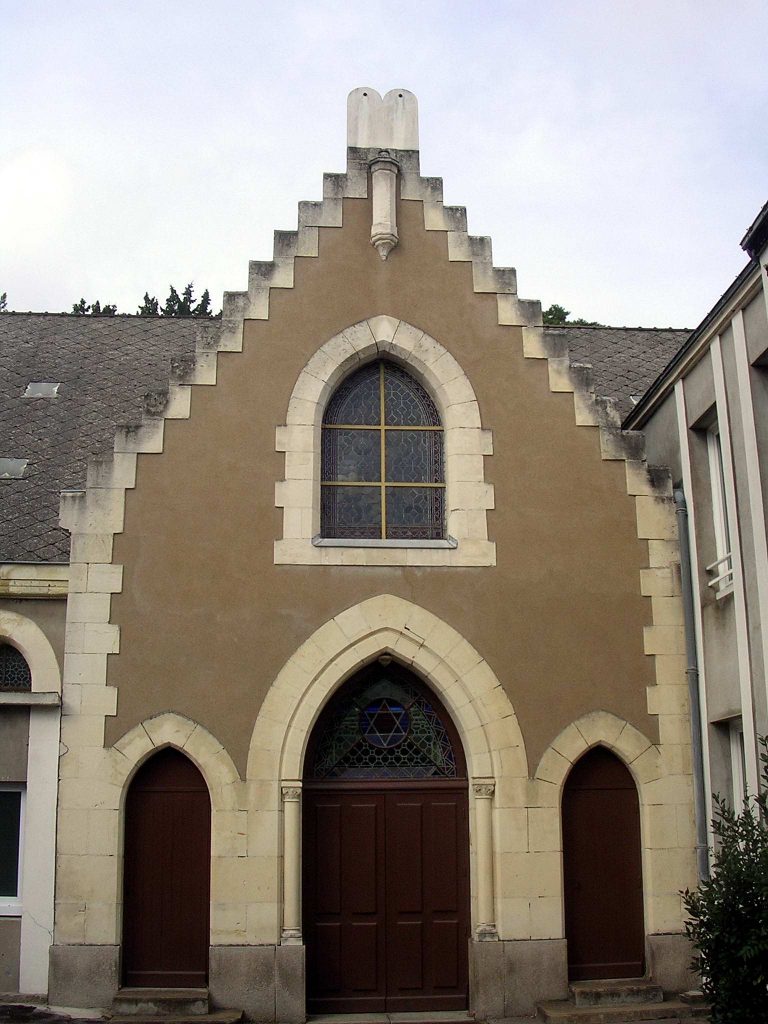Land near the ramparts of Nantes was sold by Guillaume to Théodore, a Jew from Rennes, and to the Jews of Nantes to establish a cemetery. Nevertheless, five years later, the Jews of the region are victims of looting and murder.

Following the banishment of the Jews from Brittany ordered in Ploermel on April 10, 1240, it was not until the end of the 15th century to see the return of the Jews. Gradually, the installation of Marran families is authorized by royal policy.
Philip II, King of Spain, banished the Jews who settled mainly in Nantes and Bordeaux. At the beginning of the 1590s, Portuguese Jews stayed in Nantes. Among them was Abraham Espinoza, the grandfather of the famous philosopher, who then settled in Amsterdam.
In 1636, Jews from Bayonne, expelled during the Franco-Spanish war, took refuge in Nantes. At the end of the 18th century, Nantes merchants attacked newly established Jewish merchants. The local press shows support for these victims.
During the 1808 census, only the presence of 25 Jews was counted in the department. In April 1835, the Jews of Nantes, who counted 18 families, asked the mayor for permission to build a temple on Franklin Street, in order to exercise their worship. The first synagogue thus saw the light of day in this year.
The censuses show a variation in the population. Thus, in 1841, there would be 154 or 240 Jews according to different estimates. 105 in 1854, then 133 in 1861.
In 1871, the synagogue on rue Copernic was inaugurated. From 1882 to 1929, Samuel Korb was the rabbi. Two of his sons were killed in the war.
In a census in 1942, the Vichy government counted 531 Jews in Nantes. A year later, there were only 53 left, following arrests and deportations.
The community of Nantes slowly rebuilt itself after the war. Thus, there were only 25 Jewish families in the city in 1960. The arrival of Jews from North Africa during the decade allowed development, and in 1969 there were 500 Jews in Nantes. The synagogue is also used today as a community center.
In February 2024, the Jewish community of Nantes celebrated the 154th anniversary of the synagogue, built in 1870. To mark the occasion, the Association culturelle des amis du judaïsme de l’Ouest opened its doors for a week of tours, an exhibition, and lectures on the history and daily life of the Jewish community in Nantes and the department.
On 21 July 2024, a ceremony was held in front of the 50 Hostages monument in memory of the round-up on 16 July 1942, during which a descendant of the Righteous testified.
Fabrice Rigoulet-Roze, Prefect of Loire-Atlantique and Pays de la Loire, Ariel Bendavid, Rabbi of Brittany and Pays de la Loire, and René Gambin, head of the Jewish community in Nantes, spoke at the ceremony. Gambin recalled the courage of the Righteous, who risked their lives to save Jews and set an example for all generations of French people. Olivier Château, deputy mayor of Nantes, then laid a wreath in memory of the victims of racist and anti-Semitic crimes and in tribute to the Righteous of France. Gilles Gautron, ‘grandson and son of the Righteous’, then told the story of the Poitiers network to which his grandparents belonged, and how his family saved Jews during the Holocaust.
Sources : Ouest France